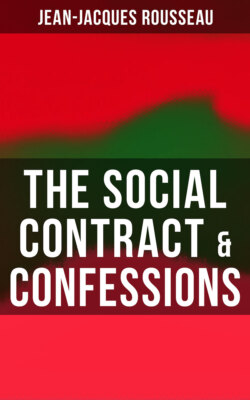The Social Contract & Confessions

Реклама. ООО «ЛитРес», ИНН: 7719571260.
Оглавление
Jean-Jacques Rousseau. The Social Contract & Confessions
The Social Contract & Confessions
Reading suggestions
Table of Contents
Confessions
Introduction. by S.W. Orson
Book I
Book II
Book III
Book IV
Book V
Book VI
Book VII
Book VIII
Book IX
Book X
Book XI
Book XII
The Social Contract
(Jean-Jacques Rousseau)
Introduction
Foreword
Book I
Chapter I. Subject of the First Book
Chapter II. The First Societies
Chapter III. The Right of the Strongest
Chapter IV. Slavery
Chapter V. That We Must Always Go Back to a First Convention
Chapter VI. The Social Compact
Chapter VII. The Sovereign
Chapter VIII. The Civil State
Chapter IX. Real Property
Book II
Chapter I. That Sovereignty is Inalienable
Chapter II. That Sovereignty is Indivisible
Chapter III. Whether the General Will is Fallible
Chapter IV. The Limits of the Sovereign Power
Chapter V. The Right of Life and Death
Chapter VI. Law
Chapter VII. The Legislator
Chapter VIII. The People
Chapter IX. The People (continued)
Chapter X. The People (continued)
Chapter XI. The Various Systems of Legislation
Chapter XII. The Division of the Laws
Book III
Chapter I. Government in General
Chapter II. The Constituent Principle in the Various Forms of Government
Chapter III. The Division of Governments
Chapter IV. Democracy
Chapter V. Aristocracy
Chapter VI. Monarchy
Chapter VII. Mixed Governments
Chapter VIII. That All Forms of Government Do Not Suit All Countries
Chapter IX. The Marks of a Good Government
Chapter X. The Abuse of Government and Its Tendency to Degenerate
Chapter XI. The Death of the Body Politic
Chapter XII. How the Sovereign Authority Maintains Itself
Chapter XIII. The Same (continued)
Chapter XIV. The Same (continued)
Chapter XV. Deputies or Representatives
Chapter XVI. That the Institution of Government is Not a Contract
Chapter XVII. The Institution of Government
Chapter XVIII. How to Check the Usurpations of Government
Book IV
Chapter I. That the General Will is Indestructible
Chapter II. Voting
Chapter III. Elections
Chapter IV. The Roman Comitia
Chapter V. The Tribunate
Chapter VI. The Dictatorship
Chapter VII. The Censorship
Chapter VIII. Civil Religion
Chapter IX. Conclusion
Отрывок из книги
Jean-Jacques Rousseau
The Social Contract
.....
As this severity could not draw from me the expected acknowledgment, which obstinacy brought on several repetitions, and reduced me to a deplorable situation, yet I was immovable, and resolutely determined to suffer death rather than submit. Force, at length, was obliged to yield to the diabolical infatuation of a child, for no better name was bestowed on my constancy, and I came out of this dreadful trial, torn, it is true, but triumphant. Fifty years have expired since this adventure--the fear of punishment is no more. Well, then, I aver, in the face of Heaven, I was absolutely innocent: and, so far from breaking, or even touching the comb, never came near the fire. It will be asked, how did this mischief happen? I can form no conception of it, I only know my own innocence.
Let any one figure to himself a character whose leading traits were docility and timidity, but haughty, ardent, and invincible, in its passions; a child, hitherto governed by the voice of reason, treated with mildness, equity, and complaisance, who could not even support the idea of injustice, experiencing, for the first time, so violent an instance of it, inflicted by those he most loved and respected. What perversion of ideas! What confusion in the heart, the brain, in all my little being, intelligent and moral!--let any one, I say, if possible, imagine all this, for I am incapable of giving the least idea of what passed in my mind at that period.
.....